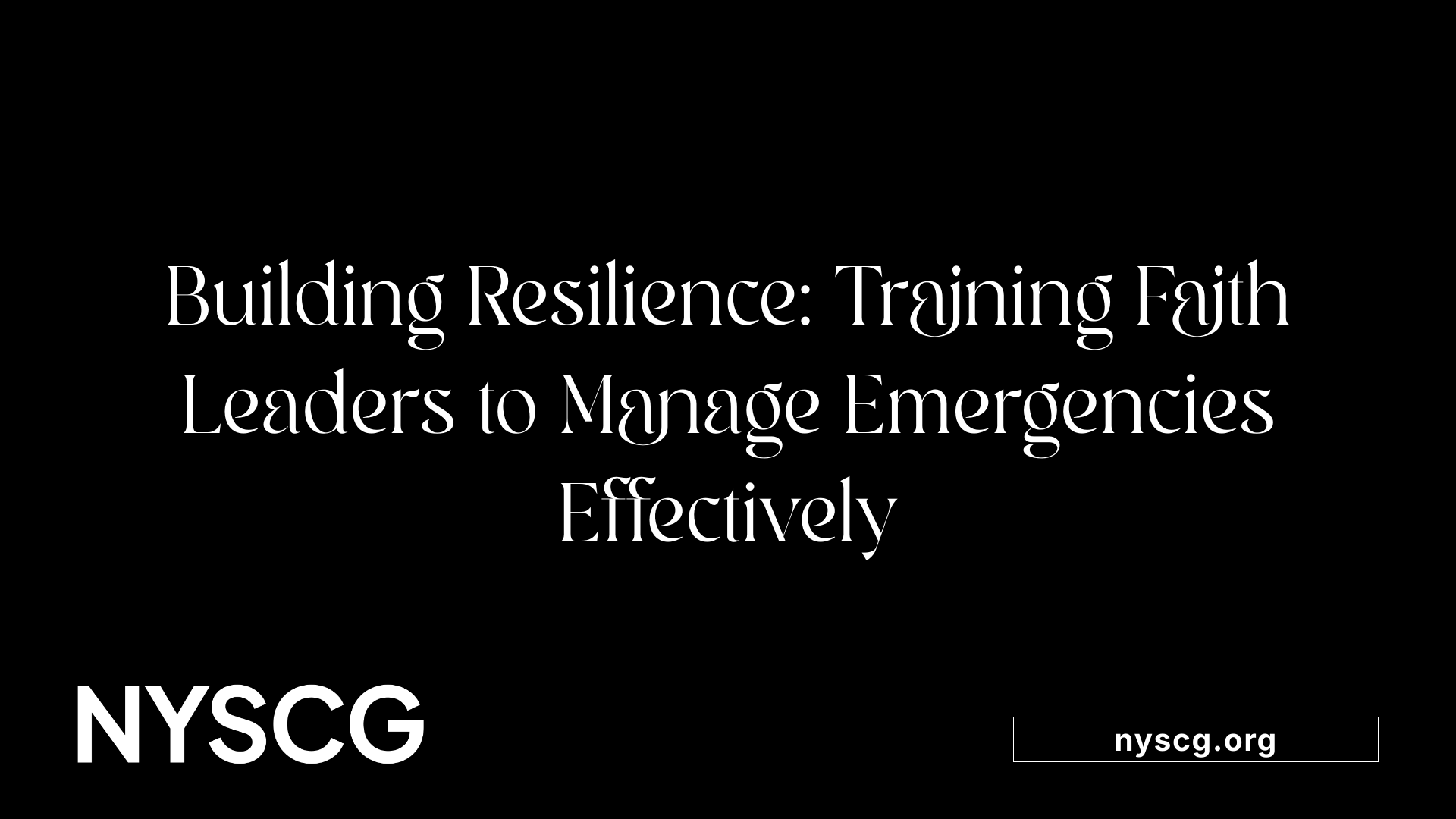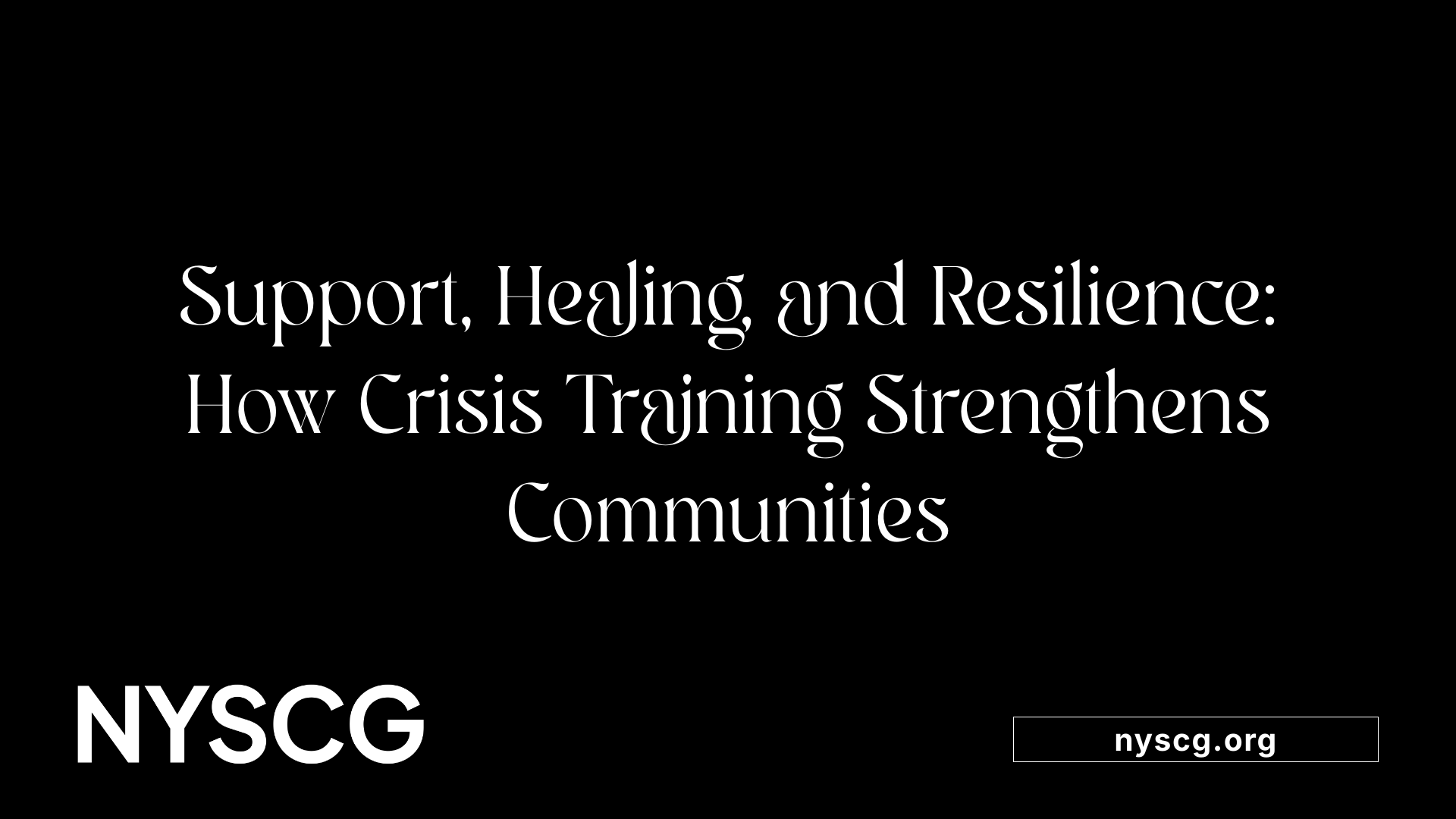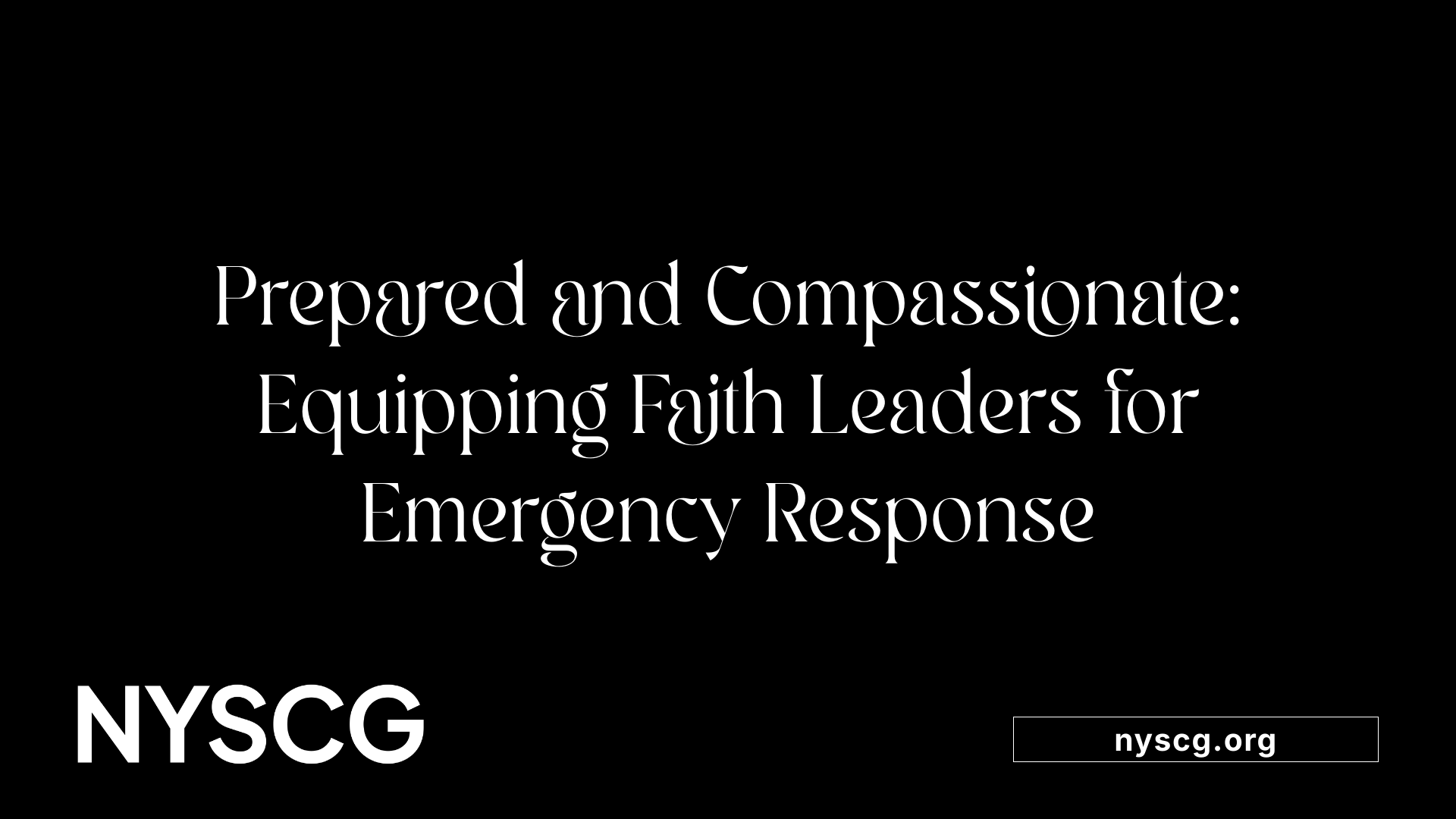Crisis Response Training for Faith Leaders: What to Expect


In an era where crises—ranging from natural disasters to personal tragedies—are increasingly prevalent, faith leaders are stepping into vital roles as first responders within their communities. Specialized crisis response training empowers these leaders with the skills, knowledge, and resources they need to provide emotional, spiritual, and practical support during times of emergency. This article explores what faith leaders can expect from crisis response training, including its structure, core content, objectives, and the lasting benefits for communities.

Crisis response training for faith leaders is designed to equip them with essential skills to support their communities through traumatic events. It generally encompasses a broad set of knowledge areas and practical techniques to manage and respond effectively during various crises.
A primary focus is understanding psychological trauma. Leaders learn to recognize the signs and reactions that individuals might exhibit after experiencing a tragedy, such as grief, anxiety, or shock. This awareness helps them provide appropriate support and referrals when necessary.
Training includes crisis intervention techniques that are specifically tailored to faith-based environments. Leaders are taught methods like Pastoral Crisis Intervention (PCI) and the SAFER-R model, which provides a structured approach to caring for those affected by trauma. These strategies emphasize emotional regulation, empathetic listening, and the importance of creating safe, trusting spaces.
Emergency response protocols form another crucial part of the curriculum. Faith leaders become familiar with procedures for situations like violence, natural disasters, or accidents. This training often covers how to develop and implement church-specific safety plans, such as creating comprehensive security manuals accessible to all staff and members.
Spiritual and emotional support strategies are also emphasized. Leaders are trained to offer comfort through prayer, biblical principles, and trauma-informed care practices. They learn how to address conflict privately and swiftly, guided by biblical passages such as Matthew 18 and Proverbs 15:18, to foster healing and reconciliation.
A significant module involves crisis communication, where leaders learn how to acknowledge the crisis, communicate effectively with their congregation and external agencies, and guide their community through the transition from response to recovery. This process, known as ACT—Acknowledging, Communicating, Transitioning—helps manage the church’s response in a calm and organized manner.
Additionally, many programs include ongoing education in trauma recovery, allowing faith leaders to support long-term healing and resilience within their communities. They may also receive certifications and credits for continuing education, which enhance their capacity to respond confidently and compassionately.
Various organizations like ICISF and NOVA offer these comprehensive training modules, often featuring in-person workshops, virtual courses, and supplemental materials like manuals and ebooks. Many of these programs are provided free of charge, aiming to make crisis readiness accessible to all faith communities.
By participating in such training, faith leaders develop a multifaceted approach to crisis management—combining psychological insight, practical intervention skills, spiritual care, and effective communication—ultimately fostering a resilient, supportive church environment capable of navigating times of tragedy.

Crisis response training for faith leaders aims to prepare them to handle emergencies and traumatic events with competence, empathy, and clarity. The primary objectives are to equip leaders with practical skills for managing various crises and to empower them to support their communities emotionally, spiritually, and practically.
One of the key benefits of this training is the enhancement of emergency response skills. Faith leaders learn how to implement structured interventions such as consulting with church leadership, normalizing stress reactions, facilitating group support sessions, and promoting self-help strategies among congregation members. These skills help communities respond more effectively during crises.
Furthermore, this training nurtures the ability to build resilience and aid healing. Leaders are introduced to biblical principles like Matthew 18 and Proverbs 15:18, which guide conflict resolution and reconciliation. They also learn therapeutic techniques that support trauma recovery while reinforcing faith-based coping mechanisms.
Another focus is on recognizing psychological and spiritual reactions to crises. Leaders are trained to identify signs of distress, depression, or spiritual struggles, enabling timely referral to mental health resources or other professional support.
Continuing education and certification are vital components. Many programs include courses on Critical Incident Stress Management (CISM) and disaster spiritual care, ensuring ongoing development of skills. Leaders often participate in certifications that enhance their ability to respond adeptly, fostering trust and credibility in their roles.
The overall effect of such training is the strengthening of community bonds. Faith communities become more resilient, better equipped to manage internal conflicts, natural disasters, or health crises. Churches and faith-based organizations can serve as safe havens, resource hubs, and support networks.
In essence, crisis response training helps faith leaders navigate emergencies through a balanced integration of Scripture, prayer, and strategic intervention. It promotes preparedness for a variety of crises—be they internal conflicts, health issues, or natural disasters—and ensures that communities are supported holistically.
In addition, the training encourages ongoing professional development, keeping leaders updated with the latest crisis management strategies and certification opportunities. This continuous growth cycle ensures that faith communities remain resilient and responsive, capable of addressing complex crises effectively.
By investing in such programs, churches and faith organizations reinforce their role as pillars of support, healing, and hope in times of trouble, thereby fostering resilient, compassionate, and well-prepared communities.

Crisis response training programs designed for faith leaders utilize diverse formats to prepare them for managing emergencies effectively. These programs often combine workshops, seminars, and online courses, offering both in-person and virtual learning opportunities. Workshops and seminars allow participants to engage directly with trainers, discuss real-life scenarios, and participate in dynamic exercises.
A central feature of these programs is the inclusion of interactive modules focused on crisis leadership and communication strategies. For example, many courses teach the ACT process—Acknowledging, Communicating, and Transitioning—an approach that helps leaders guide their communities through various stages of a crisis. These modules help leaders develop skills in transparent communication, emotional regulation, and organizational transition management.
Practical, scenario-based training is a core component, often utilizing role-playing exercises that simulate crisis situations like natural disasters, internal conflict, or tragic deaths. Participants practice responding in real-time, fostering confidence and competence. These exercises enable leaders to apply principles such as trust-building, stigma reduction, and resource connection in a controlled environment.
Collaborations with external crisis response experts are common, providing specialized insights and real-world experience. These partnerships enhance the relevance and depth of training, blending academic knowledge with field expertise. Trainers typically emphasize trauma-informed approaches, mental health awareness, and spiritual support techniques to help leaders foster resilience within their communities.
The overall goal is to equip faith leaders with practical skills that promote trust and understanding during crises. By emphasizing experiential learning, these programs help leaders address issues like mental health stigma, facilitate referrals to professional services, and offer spiritual and emotional support.
In addition, long-term education often includes follow-up sessions or refresher courses to reinforce skills and introduce new strategies. Resources such as manuals, ebooks, and online modules complement live training, ensuring ongoing learning. The emphasis on interactive, scenario-based training fosters a confident, prepared leadership capable of guiding their communities effectively through emergencies.
Program ComponentDescriptionExamples/DetailsDelivery FormatsWorkshops, seminars, online coursesIn-person, virtual, blended formatsCore TopicsCrisis leadership, communication, trauma-informed careACT process, emotional regulation, trust buildingInteractive ElementsRole-playing, simulations, scenario exercisesCrisis scenario drills, peer feedbackExternal CollaborationsExpert trainers, crisis response consultantsDr. Steve Berry, mental health professionals, rescue organizationsPost-Training SupportFollow-up sessions, manuals, online resourcesRefresher courses, continuing education materialsFocus AreasTrust-building, reducing mental health stigma, resource connectionCommunity outreach, referral training, mental health education
This structured approach ensures faith leaders are not only knowledgeable but also practically prepared to serve their communities with empathy, clarity, and resilience during crises.

Crisis response training plays a vital role in equipping faith leaders with the skills needed to handle emergencies with confidence and compassion. It provides them with crucial techniques in crisis intervention and psychological first aid, enabling leaders to address immediate emotional and mental health needs within their communities.
One core aspect of this training involves teaching leaders how to communicate effectively during stressful situations. This includes employing biblical principles, such as principles from Matthew 18 and Proverbs 15:18, to foster reconciliation, understanding, and trust. Leaders learn how to deliver messages that bring reassurance and clarity, helping their congregations remain calm and focused.
In addition to communication skills, the training emphasizes the importance of preparedness. Leaders are encouraged to develop and maintain up-to-date contact information, design comprehensive emergency plans, and participate in FEMA’s incident management courses like ICS 100, 200, 700, and 800. These courses ensure they understand the logistics, coordination, and safety protocols required during various types of crises, from natural disasters to internal conflicts.
The integration of therapy and faith-based support forms a cornerstone of effective crisis management. Leaders are trained to combine modern therapeutic techniques with spiritual care, creating a holistic approach that addresses both emotional healing and spiritual nourishment. This approach helps individuals process trauma while reinforcing their faith and trust in divine guidance.
Furthermore, training encourages community resilience by fostering a culture of ongoing readiness. This includes practicing drills, reviewing and updating emergency plans, and participating in disaster preparedness exercises like the Semper Paratus mindset. Such efforts ensure faith communities are not only reactive but proactively resilient.
Long-term recovery strategies are also covered, guiding leaders in supporting their communities beyond immediate response phases. These strategies involve organizing support groups, coordinating outreach efforts, and collaborating with agencies specializing in disaster recovery.
Overall, crisis response training enhances faith leaders’ ability to serve as steady anchors during crises. By combining practical skills with spiritual and emotional support, they can lead their communities through difficult times with empathy, competence, and faith, ultimately fostering recovery and renewal.
Crisis response training tailored for faith leaders encompasses a variety of essential strategies and skills designed to equip them for effective action during emergencies. One primary focus is on developing strong crisis communication techniques, enabling leaders to deliver clear, honest, and compassionate messages that foster trust and calm within their congregations and communities.
A critical component is trauma-informed care, which helps leaders understand how traumatic events impact individuals and how to respond with empathy. Self-care practices are integrated into training to ensure leaders maintain their own emotional and spiritual well-being, preventing burnout while remaining resilient.
The training emphasizes the integration of biblical principles with professional therapeutic techniques. Leaders learn to combine Scripture, prayer, and pastoral care with active listening, mindfulness, and other therapeutic approaches that promote healing and support.
Creating detailed crisis management plans forms part of the curriculum. These plans incorporate risk assessment procedures, roles and responsibilities, and resource coordination to streamline responses to various emergencies, from natural disasters to internal conflicts.
Utilizing modern technology is also highlighted, including communication tools and virtual platforms, which expand support options and facilitate remote or widespread outreach.
Furthermore, leaders are trained to build and strengthen community partnerships, fostering collaboration with local organizations, mental health resources, and emergency services. They develop culturally sensitive approaches to address diverse populations, recognizing different backgrounds and needs.
Ongoing education remains a cornerstone—faith leaders are encouraged to continually update their knowledge through workshops, seminars, and support networks. These resources provide emotional support, shared experiences, and practical guidance, helping leaders sustain their effectiveness over time.
In essence, crisis response training is comprehensive, equipping faith leaders with the skills, strategies, and resources necessary to serve their communities with compassion, competence, and confidence during times of crisis.
Crisis response training for faith leaders is a comprehensive process that integrates clinical, spiritual, and practical elements to prepare leaders for the complex demands of emergencies. From understanding trauma to developing communication strategies and fostering resilience, this training empowers faith leaders to serve as trusted pillars of support during their communities’ most vulnerable moments. As crises continue to impact societies worldwide, ongoing education, collaboration with external agencies, and a focus on culturally sensitive approaches are vital to ensuring faith communities can navigate these challenges with confidence, compassion, and hope.
All you need is the will to make the world a better place.
New York State chaplain group inc. is a tax deductible organization with a federal tax Id number 92-383-4921